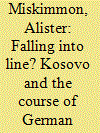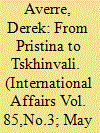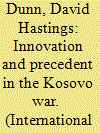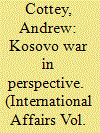|
|
|
Sort Order |
|
|
|
Items / Page
|
|
|
|
|
|
|
| Srl | Item |
| 1 |
ID:
088648


|
|
|
|
|
| Publication |
2009.
|
| Summary/Abstract |
The Kosovo war was a decisive catalyst in the development of the EU's international security role. The escalating crisis in Kosovo confirmed that the EU was still unable to prevent, contain or end violent conflict along its own borders. This led the EU to augment both its hard and soft power through the launch of the European Security and Defence Policy and the Stabilisation and Association Process. These initiatives endowed the EU with the potential to make a distinct contribution to international conflict management. Unsurprisingly, this continuing transformation has encountered significant obstacles relating to capabilities, political will and coordination. Concerns have also been raised about how the development of a military dimension has changed the nature of EU power. However, the EU has not abandoned the core principle upon which its international role was founded, namely the need to transcend conflict. Ten years after its failings in Kosovo, the EU is assuming increasing responsibility for conflict management and becoming a more capable international security actor.
|
|
|
|
|
|
|
|
|
|
|
|
|
|
|
|
| 2 |
ID:
088663


|
|
|
|
|
| Publication |
2009.
|
| Summary/Abstract |
Germany's role in Operation Allied Force has been described as a watershed in its foreign policy. It remains perhaps the pinnacle of Germany's security and defence policy transition after the Cold War. Germany's participation in Operation Allied Force was the first aggressive use of force by the Bundeswehr since the Second World War and, remarkably, was undertaken without a United Nations Security Council mandate. The deployment of German forces in 1999 suggested that German reluctance to burden-share in crisis management alongside NATO allies had been overcome. Yet Germany remains a cautious actor when it comes to the deployment of offensive military force. In this regard, Germany has maintained a considerable degree of continuity in its foreign and security policy after unification, a theme which this article will outline.
|
|
|
|
|
|
|
|
|
|
|
|
|
|
|
|
| 3 |
ID:
088664


|
|
|
|
|
| Publication |
2009.
|
| Summary/Abstract |
This article reviews the main developments in the Kosovo crisis in the context of relations between Russia and NATO/the West. For Moscow, Operation Allied Force constituted a flagrant breach of international law, a threat to post-Cold War European security governance and a challenge to Russia's status in the international order. Official Russian interpretations, heavily influenced by domestic politics, reflect a perception among Russia's political elite that, rather than upholding liberal democratic values, NATO's intervention constituted a selective defence of the interests of the leading western powers.
Such views have influenced Moscow's position on the thorny question of Kosovo's independence and Russia's more assertive foreign and security policy in the recent period, not least in the conflict over South Ossetia in August 2008. Ultimately, Operation Allied Force resulted in the Russian governing elite reassessing its views on statehood, the international order and the norms underpinning international society.
|
|
|
|
|
|
|
|
|
|
|
|
|
|
|
|
| 4 |
ID:
088645


|
|
|
|
|
| Publication |
2009.
|
| Summary/Abstract |
Some have argued that NATO's air campaign against Serbia in 1999 was manifestly unlawful, others that it was an entirely legitimate humanitarian intervention. A third position suggests that the intervention while unlawful, in the strictest sense, was nonetheless legitimate. Here, a customary law right to intervene was seen as emerging, permitting action to prevent a mass atrocity crime, even when UN Security Council authorization was absent. Did Operation Allied Force, then, add to the case for the emergence of this new customary norm? While the 1990s was a decade of humanitarian intervention, the decade since has been dominated by international action against terrorism and, of course, the effects of the highly controversial US and British led invasion of Iraq. In this context, there is scant evidence that a customary right or obligation to intervene for humanitarian reasons has crystallized since 1999. But if Kosovo achieved anything, it was to prompt greater attention to the merits of the argument in favour of a 'responsibility to protect'. If NATO's 1999 action were repeated today in a similarly unauthorized manner it would still be unlawful, but it would perhaps be seen as a legitimate means to preventing a mass atrocity crime.
|
|
|
|
|
|
|
|
|
|
|
|
|
|
|
|
| 5 |
ID:
088649


|
|
|
|
|
| Publication |
2009.
|
| Summary/Abstract |
The 1990s was a period of strategic innovation in US foreign policy. Operation Allied Force in particular represented an important step in the contorted evolution of America's attitude towards the use of force in the post-Cold War period. That operation demonstrated the growing influence of humanitarian concerns and the extent to which America was willing to reconsider Cold War criteria on the prudence and utility of force in support of its foreign policy. In its decision to intervene in Kosovo, the Clinton administration also divided opinion among the military. This, in effect, reduced the premium placed on the counsels of the armed forces and made it easier for the Bush administration subsequently to ignore their advice. Furthermore, having fought the war multilaterally through NATO, Operation Allied Force made America more wary of doing so again. In other words, the intervention set a number of precedents and left a significant legacy for the way in which US foreign policy was pursued in the decade that followed. This legacy is considered in two parts: the first analyses those issues associated with the use of force debate; the second considers how the Kosovo experience affected US attitudes to coalition warfare.
|
|
|
|
|
|
|
|
|
|
|
|
|
|
|
|
| 6 |
ID:
088641


|
|
|
|
|
| Publication |
2009.
|
| Summary/Abstract |
This article has four objectives: first to make a case for the significance of the Kosovo war in contemporary history; second, to present an overview of the crisis itself and the military confrontation which was its consequence; third, to survey the initial controversies aroused by military action-and, specifically, the debates surrounding NATO's Operation Allied Force; and finally, to reference the longer term significance of the Kosovo war in terms of the themes covered by the remaining contributions which make up this volume
|
|
|
|
|
|
|
|
|
|
|
|
|
|
|
|
| 7 |
ID:
088665


|
|
|
|
|
| Publication |
2009.
|
| Summary/Abstract |
In historical perspective, the Kosovo war stands as a significant turning point. Within the Balkan region, Operation Allied Force marked the end of the nationalist wars of the 1990s and the beginning of a new phase of partnership and integration with the EU and NATO. In terms of the wider European security order, its repercussions were contradictory. NATO reasserted its role as Europe's leading security institution, yet Operation Allied Force also gave significant momentum to the EU's development as a quasi military body. Further afield, an immediate crisis erupted in Russo-western relations followed by renewed cooperation on the ground; the longer-term impact, however, was a lingering resentment in Moscow at NATO action. At the global level, meanwhile, Operation Allied Force appeared to symbolize the primacy of both American-led western power and of the liberal norms and values that underpinned the intervention. But this was arguably a high point: future global security crises would be managed in the context of the rising power of the non-western world, a more fragmented West and greater contestation over the norms that should underpin international society.
|
|
|
|
|
|
|
|
|
|
|
|
|
|
|
|
| 8 |
ID:
088646


|
|
|
|
|
| Publication |
2009.
|
| Summary/Abstract |
NATO has throughout its history been the subject of prognostications of crisis and dissolution. Indeed, the alliance has been written off so many times that crisis as normality has come to typify its development. In the twenty-year history of NATO's post-Cold War development, Operation Allied Force stands midway between the existential moment that was the collapse of the Soviet bloc and the current travails being experienced in Afghanistan. A comparison of NATO's experience in the Balkans and in the Afghan theatre suggests that the view of a NATO perched permanently at the edge of collapse is problematic and misleading. This is not to defend alliance actions as such but rather to suggest that the narrative of crisis and collapse makes for poor analysis and underestimates NATO's proclivity for adaptation and endurance.
|
|
|
|
|
|
|
|
|
|
|
|
|
|
|
|
| 9 |
ID:
088643


|
|
|
|
|
| Publication |
2009.
|
| Summary/Abstract |
This article challenges the historical amnesia surrounding the whirlwind of international recognition of the state of Kosovo. It explores three theses concerning the role of international intervention and local politics in state formation. First, the article contends that Kosovar Albanians were 'backed into' the independent state option. Second, it makes a distinction between 'parallel states' and 'parallel societies', and explores the inadequacy of the thesis that, in the case of Kosovo, a parallel entity was waiting in the wings, prepared to step up and assume the mantle of a fully operational independent state. Third, it argues that Operation Allied Force was central to the eventual recognition of the independent State of Kosovo.
|
|
|
|
|
|
|
|
|
|
|
|
|
|
|
|
| 10 |
ID:
088651


|
|
|
|
|
| Publication |
2009.
|
| Summary/Abstract |
Operation Allied Force had a decisive impact on Tony Blair's leadership of UK foreign policy. This article begins with Blair's famous Chicago speech of April 1999; his clearest statement of an apparently underlying moral purpose in international relations. It then contrasts the conventional wisdom that over Kosovo Blair was acting out of a sense of moral obligation (sharpened by recent British failings to act to prevent humanitarian disasters in the Balkans) with a revisionist account centring on the domestic political considerations impelling Blair into this particular foreign policy adventure. Blair drew three lessons from his involvement in Operation Allied Force: that media presentation was a crucial aspect of implementing a successful foreign policy strategy; that he had been too cautious between 1997 and 1999, partly as a result of being chained to the vagaries of public opinion; and that he could generate robust and worthy foreign and defence policies sitting with his close advisers on the sofa of his 'den' in Downing Street rather than working through traditional channels. The key argument in conclusion is that there was a Tony Blair before Iraq, one who was genuinely set on building a consensus around humanitarian intervention.
|
|
|
|
|
|
|
|
|
|
|
|
|
|
|
|
|
|
|
|
|